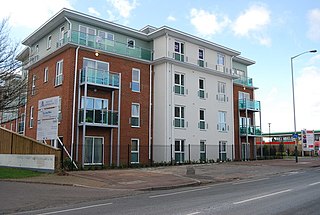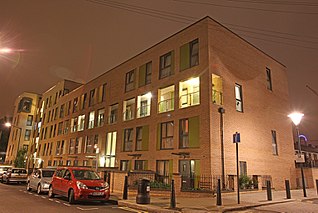Related Research Articles

The United States Department of Housing and Urban Development (HUD) is one of the executive departments of the U.S. federal government. It administers federal housing and urban development laws. It is headed by the Secretary of Housing and Urban Development, who reports directly to the President of the United States and is a member of the president's Cabinet.
The Housing Corporation was the non-departmental public body that funded new affordable housing and regulated housing associations in England. It was established by the Housing Act 1964. On 1 December 2008, its functions were transferred to two new organisations, the Homes and Communities Agency and the Tenant Services Authority.

In Ireland and the United Kingdom, housing associations are private, non-profit making organisations that provide low-cost "social housing" for people in need of a home. Any budget surplus is used to maintain existing housing and to help finance new homes and it cannot be used for personal benefit of directors or shareholders. Although independent, they are regulated by the state and commonly receive public funding. They are now the United Kingdom's major providers of new housing for rent, while many also run shared ownership schemes to help those who cannot afford to buy a home outright.
The Environment Agency (EA) is a non-departmental public body, established in 1996 and sponsored by the United Kingdom government's Department for Environment, Food and Rural Affairs, with responsibilities relating to the protection and enhancement of the environment in England.

Bank regulation is a form of government regulation which subjects banks to certain requirements, restrictions and guidelines, designed to create market transparency between banking institutions and the individuals and corporations with whom they conduct business, among other things. As regulation focusing on key factors in the financial markets, it forms one of the three components of financial law, the other two being case law and self-regulating market practices.
In general, compliance means conforming to a rule, such as a specification, policy, standard or law. Compliance has traditionally been explained by reference to the deterrence theory, according to which punishing a behavior will decrease the violations both by the wrongdoer and by others. This view has been supported by economic theory, which has framed punishment in terms of costs and has explained compliance in terms of a cost-benefit equilibrium. However, psychological research on motivation provides an alternative view: granting rewards or imposing fines for a certain behavior is a form of extrinsic motivation that weakens intrinsic motivation and ultimately undermines compliance.

The Chartered Trading Standards Institute (CTSI) is a professional association which represents and trains trading standards professionals working in local authorities, business and consumer sectors and in central government in the UK and overseas.

The Scottish Environment Protection Agency is Scotland's environmental regulator and national flood forecasting, flood warning and strategic flood risk management authority. Its main role is to protect and improve Scotland's environment. SEPA does this by helping business and industry to understand their environmental responsibilities, enabling customers to comply with legislation and good practice and to realise the economic benefits of good environmental practice. One of the ways SEPA does this is through the NetRegs environmental guidance service. It protects communities by regulating activities that can cause harmful pollution and by monitoring the quality of Scotland's air, land and water. The regulations it implements also cover the storage, transport and disposal of radioactive materials.

The Financial Reporting Council (FRC) is an independent regulator in the UK and Ireland based in London Wall in the City of London, responsible for regulating auditors, accountants and actuaries, and setting the UK's Corporate Governance and Stewardship Codes. The FRC seeks to promote transparency and integrity in business by aiming its work at investors and others who rely on company reports, audits and high-quality risk management.

The Department for Levelling Up, Housing and Communities (DLUHC), formerly the Ministry for Housing, Communities, and Local Government (MHCLG), is a department of His Majesty's Government responsible for housing, communities, and local government in England and the levelling up policy. It was established in May 2006 and is the successor to the Office of the Deputy Prime Minister, established in 2001. The department shares its headquarters building, at 2 Marsham Street in London, with the Home Office. It was renamed to add Housing to its title, changed to a ministry in January 2018, and later reverted to a government department in the 2021 reshuffle.

Poplar HARCA is a housing association in the East End of London, England. It is the landlord of about 9,000 homes in the East London area, a quarter of which have been sold leasehold; the remainder are let on assured tenancies at subsidised rent levels.

The Care Inspectorate is a scrutiny body which supports improvement. They look at the quality of care in Scotland to ensure it meets high standards. Where improvement is needed, they support services to make positive changes. The Care Inspectorate was set up in April 2011 by the Scottish Government as a single regulatory body for social work and social care services, including child protection and the integration of children's services. The new organisation took on work in these areas previously carried out by:

The New Jersey Department of Community Affairs is a governmental agency of the U.S. state of New Jersey.
The Tenant Services Authority (TSA) was the operating name of the Office for Tenants and Social Landlords, the former regulatory agency of registered providers of social housing in England.
Homes England is the non-departmental public body that funds new affordable housing in England. It was founded on 1 January 2018 to replace the Homes and Communities Agency (HCA).
The Financial Sector Legislative Reforms Commission (FSLRC) is a body set up by the Government of India, Ministry of Finance, on 24 March 2011, to review and rewrite the legal-institutional architecture of the Indian financial sector. This Commission is chaired by a former Judge of the Supreme Court of India, Justice B. N. Srikrishna and has an eclectic mix of expert members drawn from the fields of finance, economics, public administration, law etc.
The Scottish Housing Regulator (SHR) is an independent Non-Ministerial Department, directly accountable to the Scottish Parliament. The body was established on 1 April 2011 under the Housing (Scotland) Act 2010. SHR is the successor to the previous Scottish Housing Regulator agency, which exercised Scottish Ministers' powers under the Housing (Scotland) Act 2001.
Curo Group is a not-for-profit housing association based in Bath, England. Curo's operating area is the West of England, with the majority of its homes located in Bath and North East Somerset where it is the largest housing provider.

Clarion Housing Group is the largest housing association in the United Kingdom with 125,000 properties across more than 170 local authorities. Clarion Provides a home to over 350,000 people.
References
- ↑ Scottish Parliament – Environment and Rural Development Committee Archived 2010-04-23 at the Wayback Machine , 27 April 2005. Retrieved 2011-09-29.
- ↑ A Partnership for a Better Scotland: Partnership Agreement, Scottish Government. Retrieved 2011-09-29.
- ↑ "Future for housing in Scotland" (Press release). Scottish Government. 31 October 2007. Retrieved 1 January 2016.
- ↑ "About us". Communities Scotland. Archived from the original on 4 January 2006. Retrieved 29 September 2011.
- ↑ "Grants". Communities Scotland. 2006. Archived from the original on 25 September 2006. Retrieved 29 September 2011.
- ↑ "Regulation and Inspection". Communities Scotland. Archived from the original on 6 January 2007. Retrieved 29 September 2011.